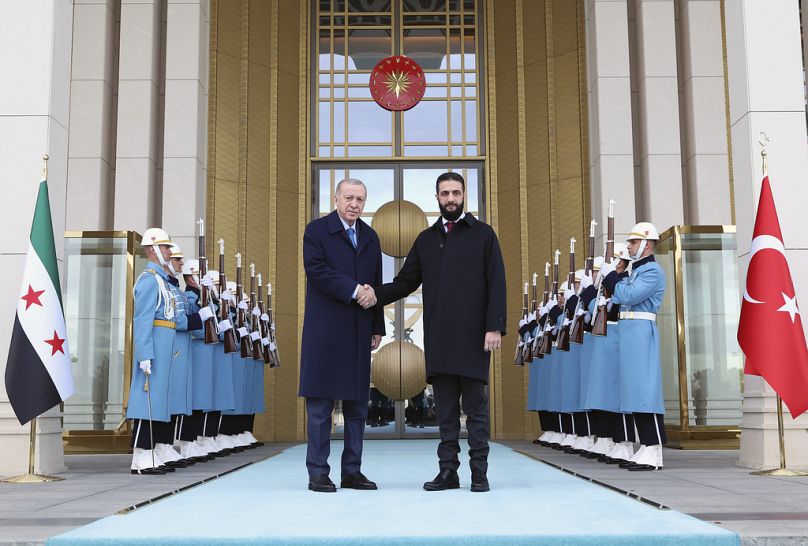Muhamad Yehia
Turkey, who shares a 910 kilometre border with Syria, is considered a key ally of its new administration.
Turkish President Recep Tayyip Erdoğan welcomed Syria’s interim president, Ahmad al-Sharaa at the presidential palace in Ankara in Turkey on Tuesday to discuss Syria’s economic recovery and its security and stability.
At a joint press conference following the meeting at the presidential palace, Al-Sharaa said Turkey and Syria were planning a “joint strategy” to tackle security threats to both countries.
“We discussed the threats that would prevent the unity of Syrian lands in northeastern Syria,” the former rebel leader said.
One of the threats to Turkey are the presence of Kurdish-led forces in the north of Syri
Turkey views the Syrian Kurdish militias, who are part of the US-allied, Kurdish-led Syrian Democratic Forces (SDF) as an extension of the banned Kurdistan Workers’ Party. They are pressing for the group to disband, and Turkish-backed fighters are battling the SDF in an attempt to push the Kurdish militias away from the Turkish border.
“We also discussed the need for international pressure on Israel to withdraw from the buffer zone in southern Syria and implement the 1974 agreement,” he added.
Al-Sharaa was appointedas interim president last week. He was the former leader of the Hayat Tahrir al-Sham (HTS) organisation, who lead the insurgents who toppled President Bashar Al-Assad in December.
It marked his second international trip, following his recent visit to Saudi Arabia earlier this month.
Al-Sharaa was welcomed by the Erdoğan and a small group of the honour guards at the entrance of the presidential palace. It was a low-key ceremony compared to visits by other heads of state, who are usually received with military bands and troops escorting them.
Turkey was a strong backer of groups opposing al-Assad during the 13-year civil war, and are therefore considered a key ally to the new administration.
Turkey, who shares a 910 km border with Syria, has also hosted the greatest number of Syrian refugees following the outbreak of the war in 2011, welcoming more than 3.8 million people at its peak in 2022.
 موقع وجه أفريقيا موقع وجه أفريقيا هو موقع مهتم بمتابعة التطورات في القارة الأفريقية
موقع وجه أفريقيا موقع وجه أفريقيا هو موقع مهتم بمتابعة التطورات في القارة الأفريقية



